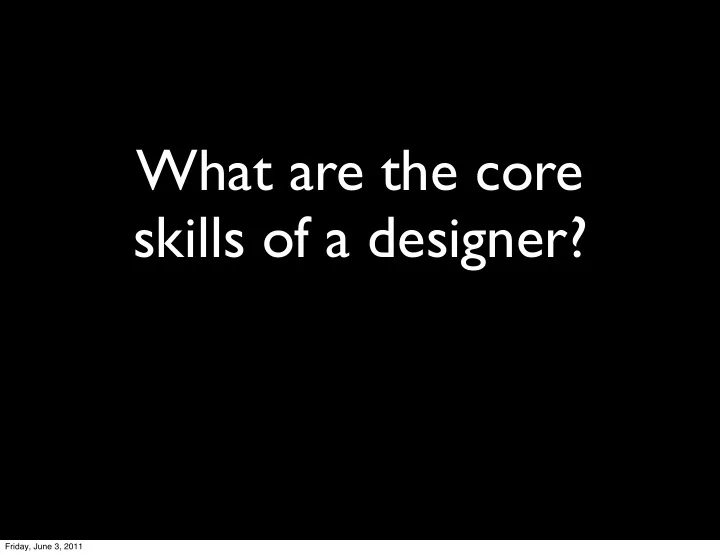

What are the core skills of a designer? Friday, June 3, 2011
The Core Skills of a Designer • To synthesize a solution from all of the relevant constraints • To frame, or reframe, the problem and objective • To create alternatives • To select from those alternatives • Prototyping [Moggridge] Friday, June 3, 2011
The Core Skills of a Designer • To synthesize a solution from all of the relevant constraints • To frame, or reframe, the problem and objective • To create alternatives • To select from those alternatives • Prototyping [Moggridge] Friday, June 3, 2011
How do you generate new ideas? Friday, June 3, 2011
Analogy Metaphor Simile Friday, June 3, 2011
Analogy { Local Mac ≈ Alto Genetic Algorithms Distant Neural Networks “We may say most aptly that the Analytical Engine weaves algebraic patterns just as the Jacquard loom weaves flowers and leaves.” — Ada Lovelace [Sanders & Thagard] Friday, June 3, 2011
Make the familiar strange Make the strange familiar [W. J.J. Gordon, Synectics ] Friday, June 3, 2011
Intense Mode Creativity • Whiteboard • Paper • Focus [Sanders & Thagard] Friday, June 3, 2011
Casual Mode Creativity 1. Immersion in problem domain 2. Absence of immediate pressure 3. Absence of distractions 4. Mental relaxation 5. Unstructured time 6. Solitude [Sanders & Thagard] Friday, June 3, 2011
⇒ Casual Mode Creativity • take a shower light physical activity • go for a walk that you are • garden comfortable with and not distracted by • knit • cook • doodle Friday, June 3, 2011
Guiding Your Search Friday, June 3, 2011
Guiding Your Search • Morphological Analysis • Relax a Constraint • Find another Pareto point • Try a different architectural style / pattern • Change the technology • Local analogy to normal programs • What would Dijkstra do? Friday, June 3, 2011
Morphological Analysis • Identify components • Compute all component combinations • Evaluate each • Find the Pareto Front Friday, June 3, 2011
Relax a Constraint • Restaurants: • have menus • serve food • charge money for food • The kernel manages the file system Friday, June 3, 2011
Another Pareto Point • Your current design(s) represent different trade-offs in terms of the analytical criteria • Pick a different trade-off and design for it Friday, June 3, 2011
Different Pattern/Style • Garlan & Shaw designed KWIC in four different architectural styles • they have additional (larger) case studies • Exercise #2 used two different patterns for a simple calculator • Grab a catalog of patterns/styles and start browsing through it Friday, June 3, 2011
Change the Technology • Weak Form: • substitute an interchangeable component • Strong Form: • change programming paradigms • Haskell? Prolog? • etc. Friday, June 3, 2011
Local Analogy to the Normal Programs • OS : monolithic, microkernel, hypervisor • DB : hierarchical, relational row-store, relational column-store, object-oriented, time-series • Compilers : ahead-of-time batch, ahead-of- time incremental, just-in-time, interpreter • Distributed systems : centralized, p2p Friday, June 3, 2011
What would Dijkstra do? • Simon Peyton-Jones • Linus Torvalds • Tony Hoare • Larry Wall • Rob Pike • Donald Knuth • Joshua Bloch • David Parnas • Michael Stonebreaker • Fred Brooks • Ted Codd • Michael Jackson Friday, June 3, 2011
Can creativity be done in a group? Or is it a flicker of solitary genius? Friday, June 3, 2011
Group Approaches • Brainstorming • Think, Pair, Share • Six Hats [de Bono] • Synectics [Gordon] • etc Friday, June 3, 2011
blurt out ideas lower inhibitions don’t judge aim for quantity don’t discuss set a quota Friday, June 3, 2011
sketch k ideas Think: Pair: annotate sketches Share: post & discuss Friday, June 3, 2011
Six Thinking Hats [de Bono] Friday, June 3, 2011
Friday, June 3, 2011
Hat Sequences • Initial Ideas: • Solving Problems: • Choosing: • etc. Friday, June 3, 2011
Solve an Analogous Problem problem to analogous problem Group solves P’ Facilitator reveals original Facilitator maps original P’ S’ problem and mapping P S [W.J.J. Gordon, Synectics ] Friday, June 3, 2011
Friday, June 3, 2011
Recommend
More recommend